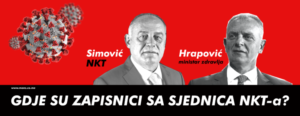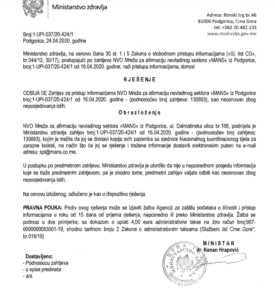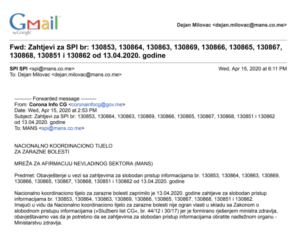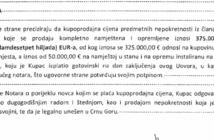For two months now, the Minister of Health, Kenan Hrapović, has been refusing to submit to MANS the minutes from the sessions of the National Coordination Body for Communicable Diseases (NCB), claiming that his ministry does not have them, although at the end of March, he personally signed the decision on the establishment of that body, of which he is also a member. At the beginning of the epidemic, NCB also declared itself non-competent to provide information, and referred us to the Ministry of Health, as its founder.
MANS also requested the minutes from the sessions from the Secretariat-General of the Government, but we were once again referred to the Ministry of Health and Minister Hrapović.
In the past three months, NCB has taken over a good part of the competences of the legislative and executive powers when it comes to combating coronavirus epidemic, especially when it comes to measures that drastically limit basic human and civil rights. Despite that, very little is still known about how decisions are made in that body that have a direct impact not only on the health of citizens of Montenegro, but also on the overall economy of the country.
Apart from decision on the establishment of NCB signed by the Minister Hrapović, there is almost no publicly available document defining the procedures of work of this body, and especially how decisions on measures are made.
Since its establishment, NCB’s sessions have been closed to the media, and apart from press releases and occasional press conferences and announcements on social media of the Government of Montenegro, there is no more detailed information on how NCB makes decisions. The same can be said for the so-called operational headquarters, which work under NCB, and in whose work at least a hundred people participate at the places where decisions are made.
In addition to the minutes, MANS requested documentation from the Ministry of Health and NCB on the purchased and donated medical equipment, its distribution, and documentation on the basis of which funds intended for suppressing of the epidemic is spent. Minister Hrapović also said that he did not have this information, although he personally participates in the work of NCB.
MANS filed complaints to the Agency for Personal Data Protection and Free Access to Information, headed by Sreten Radonjić, against all these answers of the Ministry of Health, but the Agency has been refusing to make decisions on them for more than a month.
Dejan Milovac
MANS
Unclear decisions on the payment of € 1.7 million
MANS also requested from the Secretariat-General of the Government decisions on individual payments from NCB’s account. After examining this documentation and the government decree on distribution of funds donated due to coronavirus epidemic, it is not clear on what basis NCB selected companies that have been paid over €1.7 million so far, and who exactly participated in making such decisions. This information had to be found in the minutes of the NCB’s sessions, which the Ministry of Health still refuses to make public. Each of the payment decisions was signed by the NCB chairman, Milutin Simović.
Secret contracts on purchased and donated equipment
The Ministry of Health claims that it does not have any information on the medical equipment purchased by the Government of Montenegro in China for the needs of Montenegro’s health institutions, as well as on its distribution.
Minister Hrapović claims that he does not have the documentation on the basis of which donations of medical equipment were made, as well as contracts with Thaksin Shinawatra, Jack Ma (Alibaba Group), Petros Stathis, and Aleksandar Mijajlović and Ranko Ubović. The only contract submitted to MANS upon the request for free access to information was the one on the basis of which the donation of Hajriz Brčvak was realized.
NCB – para-state body with enormous powers
It is unacceptable for a body consisting of six ministers, the director of the police administration and officers of the Agency for National Security, to have its own private account in a commercial bank, no clear line of responsibility, precisely defined competencies and public decision-making, and as such is a very powerful tool in the hands of those who limit the rights of Montenegrin citizens contrary to the law and official procedures. It is more than obvious that NCB is looking more and more like para-state body, the so-called “special unit” of the Government of Montenegro, which will continue to be a cover for continuation of non-transparent decision-making practices that affect us all.






